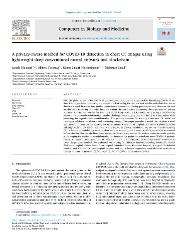| dc.contributor.author | Heidari, Arash | |
| dc.contributor.author | Toumaj, Shiva | |
| dc.contributor.author | Navimipour, Nima Jafari | |
| dc.contributor.author | Unal, Mehmet | |
| dc.date.accessioned | 2023-10-19T15:12:13Z | |
| dc.date.available | 2023-10-19T15:12:13Z | |
| dc.date.issued | 2022 | |
| dc.identifier.issn | 0010-4825 | |
| dc.identifier.issn | 1879-0534 | |
| dc.identifier.uri | https://doi.org/10.1016/j.compbiomed.2022.105461 | |
| dc.identifier.uri | https://hdl.handle.net/20.500.12469/5378 | |
| dc.description.abstract | With the global spread of the COVID-19 epidemic, a reliable method is required for identifying COVID-19 victims. The biggest issue in detecting the virus is a lack of testing kits that are both reliable and affordable. Due to the virus's rapid dissemination, medical professionals have trouble finding positive patients. However, the next real-life issue is sharing data with hospitals around the world while considering the organizations' privacy concerns. The primary worries for training a global Deep Learning (DL) model are creating a collaborative platform and personal confidentiality. Another challenge is exchanging data with health care institutions while protecting the organizations' confidentiality. The primary concerns for training a universal DL model are creating a collaborative platform and preserving privacy. This paper provides a model that receives a small quantity of data from various sources, like organizations or sections of hospitals, and trains a global DL model utilizing blockchain-based Convolutional Neural Networks (CNNs). In addition, we use the Transfer Learning (TL) technique to initialize layers rather than initialize randomly and discover which layers should be removed before selection. Besides, the blockchain system verifies the data, and the DL method trains the model globally while keeping the institution's confidentiality. Furthermore, we gather the actual and novel COVID-19 patients. Finally, we run extensive experiments utilizing Python and its libraries, such as Scikit-Learn and TensorFlow, to assess the proposed method. We evaluated works using five different datasets, including Boukan Dr. Shahid Gholipour hospital, Tabriz Emam Reza hospital, Mahabad Emam Khomeini hospital, Maragheh Dr.Beheshti hospital, and Miandoab Abbasi hospital datasets, and our technique outperform state-of-the-art methods on average in terms of precision (2.7%), recall (3.1%), F1 (2.9%), and accuracy (2.8%). | en_US |
| dc.language.iso | eng | en_US |
| dc.publisher | Pergamon-Elsevier Science Ltd | en_US |
| dc.relation.ispartof | Computers in Biology and Medicine | en_US |
| dc.rights | info:eu-repo/semantics/openAccess | en_US |
| dc.subject | Net | En_Us |
| dc.subject | Blockchain | en_US |
| dc.subject | Deep learning | en_US |
| dc.subject | Chest CT | en_US |
| dc.subject | CNN | en_US |
| dc.subject | COVID-19 | en_US |
| dc.subject | Transfer learning | en_US |
| dc.title | A privacy-aware method for COVID-19 detection in chest CT images using lightweight deep conventional neural network and blockchain | en_US |
| dc.type | article | en_US |
| dc.authorid | Heidari, Arash/0000-0003-4279-8551 | |
| dc.authorid | Jafari Navimipour, Nima/0000-0002-5514-5536 | |
| dc.authorid | Toumaj, Shiva/0000-0002-4828-9427 | |
| dc.identifier.volume | 145 | en_US |
| dc.department | N/A | en_US |
| dc.identifier.wos | WOS:000819697000005 | en_US |
| dc.identifier.doi | 10.1016/j.compbiomed.2022.105461 | en_US |
| dc.identifier.scopus | 2-s2.0-85127131173 | en_US |
| dc.institutionauthor | N/A | |
| dc.relation.publicationcategory | Makale - Uluslararası Hakemli Dergi - Kurum Öğretim Elemanı | en_US |
| dc.authorwosid | Heidari, Arash/AAK-9761-2021 | |
| dc.authorwosid | Jafari Navimipour, Nima/AAF-5662-2021 | |
| dc.identifier.pmid | 35366470 | en_US |
| dc.khas | 20231019-WoS | en_US |
















